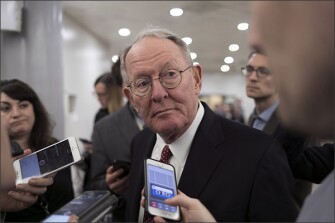
The U.S. Department of Education isn’t directly affected by the government shutdown—it’s among the agencies that had their funding approved last fall, before the crisis hit—but could the key to ending the Beltway stalemate lie in some previous education policy wheeling and dealing?
Sen. Lamar Alexander, R-Tenn., says yes. The chairman of the Senate education committee, who is retiring at the end of his term in 2020, is making the case that the negotiations behind the Every Student Succeeds Act more than three years ago provide a blueprint for helping the Trump administration and Congress reopen the government.
In a Thursday floor speech in the Senate, Alexander chastised both members of Congress and President Donald Trump for failing to reach a deal, and said they should both take lessons from 2015, when Alexander, lawmakers from both parties, and President Barack Obama worked to reauthorize the main federal education law. He said Democrats should recognize that Trump has a legitimate objective with respect to increasing border security.
And as for the Trump, Alexander says, “He should be as specific and reliable as President Obama was in 2015 when he told me he needed three things in order to sign a bill. And when Congress passed a bill with those three things in it, even though it included some things the president didn’t like, he signed the law.”
I spoke on the Senate floor and offered three specific solutions for reopening the federal government. Resolving the partial shutdown by going Real Big on immigration could be Trump’s Nixon-to-China moment in history. pic.twitter.com/6FPkOCcrEi
— Sen. Lamar Alexander (@SenAlexander) January 4, 2019
(Alexander also elaborated on these themes in a press release and in a Washington Post op-ed.)
Alexander didn’t specify what those “three things” were that Obama considered prerequisites (although based on our reporting, two of those items were the requirement to identify and intervene in schools in the bottom 5 percent for academic performance, and a new early-childhood program, both of which made it into the law). But he does say that lawmakers and Trump should consider broadening the discussion by trying to resolve questions around things like Deferred Action for Child Arrivals, or—if they really want to go “really big"—revamping the entire legal immigration system in a way that satisfies a number of objectives, in addition to resolving the shutdown.
Education and Immigration
Let’s unpack Alexander’s argument.
From a policy perspective, Alexander’s suggestions are strong, and in a different world would be viable, said Vic Klatt, who served in the U.S. Department of Education under President George H.W. Bush, and is now a principal at Penn Hill Group, a Washington lobbying group.
But Klatt said that only counts for so much when both sides could pay a huge political price for striking any grand bargain.
“This is about the president and no one else,” Klatt said. “So I think any senator from any party, for that matter, would have an almost impossible task trying to bring about compromise here, given where the president is and given where the new Congress is in the House.”
Klatt added that when it comes to Alexander, “He’s as good as anybody at bringing about compromise,” and has reached significant deals on several issues aside from education. But if Alexander were the top senator for immigration issues, Klatt said, even he would find this a tough row to hoe.
On Capitol Hill, education policy doesn’t generate the news coverage and controversy of immigration, so negotiating deals can take place while the attention of cable TV news cameras and social media is often elsewhere. We recently wrote that the 115th Congress didn’t accomplish much on education, but lawmakers did reach a bipartisan deal to reauthorize the federal law dealing with career and technical education, after years of proposals, staff work, and votes helped generate momentum. There was very little outcry about the final CTE bill, which Alexander helped push through, and there was a lot of satisfaction with the final deal, including from Trump.
By contrast, deals about any slice of immigration policy in recent years have tended to cause a huge uproar, and the bricks and mortar making up those deals have tumbled to the ground before completion. (See this item we wrote in February 2018 about the failure of Senate DACA proposals as an example.)
- Policy affecting schools involves state and local actors who can pressure federal lawmakers and officials based on their interests and experiences. By contrast, the legal immigration system, DACA, and building a border wall are ultimately federal issues, even though states can adopt policies affecting bits and pieces of the puzzle.
At some point, presumably, some combination of pressure and compromise will help end the shutdown. But Alexander himself has said that education is a national but not necessarily a federal issue; it’s probably not as easy to make that same argument about immigration.
“By the time ESSA passed, everybody thought we needed to do something about No Child Left Behind,” Klatt said.
He added that in contrast to the celebration around NCLB’s passage early in the George W. Bush administration, there was more relief than anything else when lawmakers agreed to ESSA.
“No one was going to pay a big political price on either side for getting this done,” Klatt said, referring to ESSA. “All the stars finally aligned. That’s not the case here.”
Photo: Sen. Lamar Alexander, R-Tenn., chairman of the Senate Health, Education, Labor, and Pensions Committee, speaks with reporters last year at the Capitol in Washington. (J. Scott Applewhite/AP)



